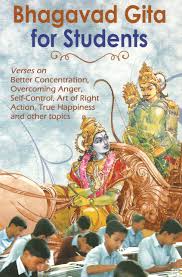
Bhagavad Gita for Students: A Detailed Guide on Applying its Teachings to Academic Success
The Bhagavad Gita is not only a spiritual text but a guide to life, offering profound wisdom on how to navigate challenges, find purpose, and live with peace and clarity. For students, the teachings of the Bhagavad Gita can provide invaluable insights that help them succeed academically, build mental resilience, and develop a balanced approach to life. In this article, we will explore the key teachings of the Bhagavad Gita that can help students thrive in their studies and personal lives.
1. Introduction to the Bhagavad Gita
The Bhagavad Gita, often referred to as the “Gita,” is a 700-verse Hindu scripture that is part of the Indian epic Mahabharata. It presents a conversation between Prince Arjuna and the god Krishna, who serves as his charioteer. In the text, Arjuna faces a moral dilemma about whether to engage in a battle against his own relatives, and Krishna imparts spiritual wisdom and practical guidance on topics like duty, righteousness, and the nature of the self.
Though ancient in its origins, the Gita’s teachings are timeless and offer valuable lessons for individuals in various walks of life, including students. The Bhagavad Gita is a manual for personal transformation, designed to help individuals navigate the challenges of life and emerge stronger.
2. The Relevance of Bhagavad Gita in Student Life
For students, the Bhagavad Gita offers more than just philosophical insights; it provides practical solutions to the real-life challenges they face. From academic stress to self-doubt, the pressures of exams, and the need to balance studies with other aspects of life, students often struggle with mental and emotional turbulence. The teachings of the Gita can serve as a compass to help students navigate these challenges effectively.
The core principles of the Bhagavad Gita—such as focus, discipline, detachment, and maintaining equanimity—are directly applicable to a student’s academic journey. By applying these teachings, students can foster mental clarity, emotional balance, and a sense of purpose in their studies.
3. Key Teachings of the Bhagavad Gita for Students
The Concept of Dharma (Duty)
In the Bhagavad Gita, Krishna explains the concept of Dharma, which refers to one’s righteous duty or responsibility. Arjuna, as a warrior, has the duty to fight in the battle, even though it is against his family. Dharma, in the context of students, refers to the responsibility that one has towards their studies, family, and society. It is about understanding the role you play in the world and fulfilling your obligations with sincerity.
For students, dharma means dedicating oneself to their studies, working hard, and striving to achieve their academic goals. By focusing on their duties, students can avoid distractions and procrastination, and instead channel their energy towards their studies.
The Importance of Detachment
Krishna teaches Arjuna the importance of performing one’s duties without attachment to the outcomes. This concept is essential for students, as many often become overly attached to the results of their exams or the approval of others. While it is natural to desire success, the Bhagavad Gita advises students to focus on the process of learning and personal growth, rather than fixating on the end result.
By practicing detachment, students can reduce the pressure and anxiety that often accompany exams and assignments. Detachment helps to develop a mindset where success and failure are seen as part of the learning process, rather than as definitive judgments of self-worth.
The Power of Focus and Concentration
One of the most significant teachings of the Bhagavad Gita is the importance of concentration. Krishna advises Arjuna to remain focused and not allow distractions to deter him from his mission. In the context of student life, focus and concentration are crucial for success. Distractions in the form of social media, peer pressure, and entertainment can impede a student’s ability to learn and perform well in exams.
To enhance focus, students can practice mindfulness and meditation techniques, as taught in the Gita. By training the mind to focus on the present task, students can improve their concentration and retention, which are essential for academic success.
Managing Stress and Anxiety
Stress and anxiety are common among students, especially when dealing with deadlines, exams, and academic pressure. The Bhagavad Gita provides profound wisdom on maintaining calmness and mental clarity in the face of challenges. Krishna encourages Arjuna to maintain equanimity and not be disturbed by the highs and lows of life. This attitude of mental balance is essential for students, as it helps them manage stress effectively.
Practical applications of this teaching include developing a positive mindset, taking deep breaths, and practicing meditation to calm the mind before exams or during stressful situations. Additionally, regular physical exercise can help reduce stress levels, promoting both mental and physical well-being.
The Role of Self-Discipline
Discipline is a recurring theme in the Bhagavad Gita, and it is emphasized as a means to spiritual and personal growth. Krishna advises Arjuna to practice self-discipline and remain committed to his mission, regardless of external circumstances. For students, self-discipline is essential for maintaining consistency in their studies, managing their time effectively, and resisting temptations.
By incorporating discipline into their daily routine, students can structure their time, prioritize tasks, and build habits that support long-term academic success. Small practices, such as setting a study schedule and sticking to it, are practical applications of the Gita’s teachings on discipline.
4. Application of Bhagavad Gita in Academic Success
Setting Clear Goals and Purpose
Krishna advises Arjuna to understand his higher purpose and act in accordance with it. For students, having a clear goal and understanding the purpose behind their studies can provide the motivation and direction needed to succeed. A sense of purpose can help students stay focused, especially when faced with distractions or challenges.
To apply this teaching, students should define their long-term academic and career goals, as well as the steps needed to achieve them. This clarity of purpose will drive their efforts and help them overcome obstacles along the way.
Facing Exam Fear and Failure
Exams are often a source of fear and anxiety for students. The Bhagavad Gita teaches that one should not be attached to success or failure. Krishna tells Arjuna that victory and defeat are part of the natural order of life, and one should act without being overly concerned about the results. This mindset is crucial for students who often feel overwhelmed by the pressure of exams.
By focusing on the preparation process rather than worrying about the outcome, students can reduce fear and anxiety. Accepting failure as a learning experience and using it as motivation to improve is a powerful application of the Gita’s teachings.
Time Management and Productivity
Krishna emphasizes the importance of acting with determination and not procrastinating. For students, effective time management is essential to balancing academic tasks, personal commitments, and leisure activities. The Bhagavad Gita teaches the importance of staying disciplined and making the most of one’s time.
Students can use time management techniques such as breaking tasks into smaller, manageable portions, setting deadlines, and eliminating distractions to improve their productivity. Following a structured routine and allocating specific times for study, rest, and recreation will help students achieve better results.
Building Self-Confidence
In the Bhagavad Gita, Krishna encourages Arjuna to have faith in himself and his abilities. Self-confidence is crucial for students, as it helps them face challenges with courage and resilience. Krishna reminds Arjuna that success is not just about skill but also about having the right attitude and mindset.
To build self-confidence, students should practice self-affirmation, focus on their strengths, and embrace challenges as opportunities for growth. By trusting in their abilities, students can face academic challenges with a positive outlook.
5. Spirituality and Well-being in Student Life
Connecting with Higher Consciousness
The Bhagavad Gita teaches the importance of connecting with the higher self or consciousness. For students, this connection can be achieved through regular meditation, mindfulness practices, and self-reflection. By taking time to quiet the mind and connect with their inner selves, students can gain clarity, focus, and peace.
Spiritual practices such as chanting, prayer, or simply sitting in silence can help students reconnect with their higher purpose and develop a deeper sense of fulfillment in their studies and life.
Meditation and Inner Peace
The Bhagavad Gita teaches that inner peace is achieved through meditation and control over the mind. By practicing mindfulness and meditation, students can reduce mental clutter, improve concentration, and foster emotional stability. Regular meditation can help students handle stress, focus on their studies, and remain calm in difficult situations.
6. Conclusion
The Bhagavad Gita offers timeless wisdom that is deeply relevant to the challenges faced by students today. From managing stress and anxiety to building discipline and focus, the teachings of the Gita can serve as a guide for students in their academic journey. By applying these principles, students can
achieve greater success, emotional well-being, and personal growth, ultimately leading to a more fulfilling and balanced life.
The Gita teaches us that true success is not just about external achievements but also about internal peace, wisdom, and alignment with one’s higher purpose. By following the path outlined in the Bhagavad Gita, students can navigate their academic journey with clarity, confidence, and spiritual depth.
